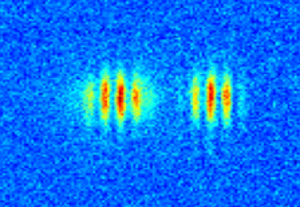Matter-wave interferometry in free fall
Quantum sensors based on matter-wave interferometry are nowadays used to measure accelerations or rotations with applications in geodesy, geophysics, navigation, or fundamental physics. Operating these sensors in microgravity allows for extended free-fall times, which could ultimately push their sensitivity by several orders of magnitude.
At the drop tower, we have already demonstrated the feasibility of this in pathfinder experiments and are now continuing to develop and test procedures and concepts for future space-based experiments based on matter-wave interferometry. Such have been proposed for example for tests of the Universality of Free Fall or for Next Generation Gravity missions using quantum sensors.
A major prerequisite for utilizing interferometry on timescales of several seconds is the ability to reduce the free expansion of the atomic ensemble. In the drop tower, we are refining these techniques, thereby creating quantum-gas ensembles equivalent to sub-nK kinetic temperature.

Related publications
H. Müntinga et al.: Interferometry with Bose Einstein Condensates in Microgravity, Phys. Rev. Lett. 110, 093602 (2013)


 "
"